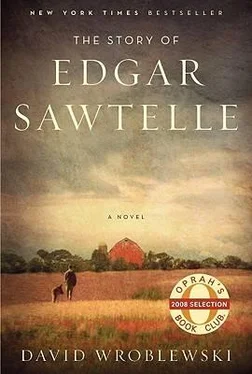Almondine trailed him down the stairs. His mother had turned out the lights in the living room and kitchen and lay in bed reading. It was ten by the kitchen clock.
“Edgar?” she called.
He walked to the door of her bedroom.
“I wish I hadn’t been short with you tonight.”
He shrugged.
“Do you want to talk more?”
No. I can’t sleep. I’m going out to the barn to look for names.
“Don’t stay out long. You’ve got circles under your eyes.”
He held the door for Almondine, but she decided it would be better to sleep on the porch. He walked to the workshop and pulled down the master litter book and paged through it. If he could find a name that fit, he would be able to get the dog’s number and, from there, its file.
And then?
He didn’t know what would happen then.
It took almost an hour to look through the entries, at first scanning the pages, then going more slowly, considering each name for a diminutive. He wound up with nothing-no possibilities, nothing even close. He made a list, filling in the blank with every possible letter and crossing out whatever looked like nonsense: “Hacdi” and “Hacqi” and “Hacwi.” It was like playing hangman, where you guessed a word one letter at a time while your opponent filled in the head, body, arms, and legs of a man on a gallows.
But in this case it was surprisingly difficult to eliminate prospects. The possibility that it was a foreign name had occurred to him, and names were more idiosyncratic than regular words. In the end, he simply had to guess. He crossed out all but six possibilities:
Hacai.
Hacci.
Hachi.
Hacki.
Hacli.
Hacti.
He looked up each word in The New Webster Encyclopedic Dictionary of the English Language, though, as he suspected, none had entries. He paged through the master litter book one last time, looking for names that could be abbreviated or distorted, but even as he ran his finger down the pages he knew it was hopeless.
Again and again, his eye returned to “Hachi.” The missing letter was an H, he was sure of it-index and middle finger extended horizontally from a closed hand. He visualized his father’s hands, translucent and wind-smeared. The problem was, the wind had gusted and he had barely seen the sign in the first place. In despair, he replaced the master litter book atop the cabinets. He could go through the files one by one, he supposed, though that would take days, weeks even. He leaned his head against a cabinet. He kicked the bottom drawer.
The drawer containing the letters.
Then he got it. Hachi was right, but it was only part of the name. Hachi-something. Hachigo? Hachiru? He’d seen the name in a letter perused and discarded while searching for letters from Brooks. He dropped to his knees and yanked open the drawer. Now that he knew what to look for, it didn’t take long. He recognized the handwriting even before he’d spotted the name.
Hachiko.
May 1935
Chicago
John,
Just a note to let you know that my friends in the diplomatic corps have sent some sad news. Hachiko was found dead in Shibuya station on the seventh of March, in the very spot where I met him so many years ago. He was waiting for Ueno, of course. By all accounts, he still made the trek each day unless his arthritis was so bad he couldn’t walk.
I have included a photograph, sent to me by my friends, of the monument that was erected for him. He walked past it for the better part of his last year. I suppose he never noticed it at all. Yet another example of our dogs exceeding their so-called masters.
How is it, John, I feel I have lost an old friend, though I met him only twice? Perhaps it is because of our Ouji. He and Charles, Jr., are inseparable companions, and I don’t think I exaggerate when I say they have equaled the bond I once had with Lucky.
I take some consolation knowing that a fraction of Hachiko’s bloodline is in my care-and yours. I hope the grand experiment is proceeding well. (I know you don’t like me calling it that, but I can’t help teasing you sometimes.) Last month, while visiting my district in Chicago, I met a family that owned a Sawtelle dog. I saw them walking down the street and bolted from the car like a madman. Perhaps you remember them? The Michaelsons? It is probably my imagination, but I swear I saw a trace of Ouji in their dog. Could it possibly be from one of his matings?
Yours, as always,
Charles Adwin
Eighth Illinois District,
United States House of Representatives
Nothing in the letter seemed significant. Edgar didn’t know of anyone named Charles Adwin. Why had his father told him to find Hachiko? Hachiko, whoever that was, was dead, and had been for many years.
He sat back.
Ueno? Ouji?
He turned back to the file cabinet. He had searched one drawer, but there was a second, also filled with old correspondence and miscellany. He began searching it for a letter postmarked from Washington, perhaps Chicago, and thus he almost missed what he was looking for, because it bore international postage. Only Charles Adwin’s distinctively broad handwriting made him take a closer look.
October 1928
Tokyo
Dear Mr. Sawtelle,
With some difficulty, I have contacted the family of Hachiko and discovered, to my amazement, that there is indeed another litter produced from the same sire and dam. I do not know how you knew this, or if this was a spectacularly lucky guess. Nor do I pretend to understand your breeding project. I know little about dogs and simply admire them like most people, ignorantly, I suppose. But admire them I do, and I have known the best of them. As a boy I had a Setter named Lucky that was the moral superior of any man I’ve known, myself included.
Hachiko is a phenomenon here in Tokyo, much talked about among the residents. The stories are true. I have stood on the Shibuya train platform in the afternoon and watched him walk out of the crowd, alone, and sit and wait for the train to arrive. He is a regal animal, pale cream in color, and he moves with great dignity. I have, as well, walked over to him and stroked his thick pelt and looked into his eyes, and I must say I felt the presence of a great soul. As we stood there, the train arrived and the doors opened and Hachiko watched to see if his master, Professor Ueno, would disembark, but of course he didn’t. Ueno hasn’t stepped off that train for nearly three years, since a stroke felled him at the university. Hachiko must know by now that he isn’t going to appear, but he waited anyway. And so I waited alongside him. A pair of foolish boys stood off to one side of the platform, laughing and taunting the dog, and before I knew what I was doing, I had run over to them and chased them away in a fury-hardly the behavior of a diplomat. Hachiko was not so easily distracted. Indeed, so assured in his posture was he, so patiently did he sit and watch that train, that I felt we were the ones blind to the truth, not Hachiko. After a long wait, he stood and walked back into the crowd, alone. The next day, he was there again, waiting for the train. I know, because I returned as well, drawn to this quiet drama for reasons I cannot easily explain.
Hachiko’s story has become widely enough known that strangers passing through Shibuya station recognize him at once. Some have begun to set food out for him. There are stories of people bursting into tears at the sight of the dog sitting and waiting. As I have already confessed, I was not without some emotion myself. I suppose one cannot conceive of such devotion in man or animal until one has seen it with one’s own eyes. There is already talk of erecting a monument to the dog.
Frankly, I was prepared to dismiss your request, but meeting Hachiko changed my mind. With some difficulty, I was able to locate the breeder. This involved following Hachiko through the streets of Tokyo, to the house where Ueno lived. There the dog paused, briefly, and I fully expected him to walk to the door. Instead he turned his gaze up the street and continued to the home of Professor Ueno’s gardener, who now cares for the dog. (The professor had no family.) The gardener was able to direct me to the breeder, Osagawa-san. I introduced myself and explained your request, and that was when I found out there was a litter. He was adamant that no dog of his could be shipped in the manner you suggest. He does not believe a pup would survive such a trip intact in mind and body, and refuses to consider the idea. He said (after I calmed him) that you are welcome to come to see the pups yourself, at which time he would discuss whether you might be a fit owner. I explained that such a trip was not within your means. Osagawa-san is quite devoted to his dogs. I think he is right about the pup traveling. Though they have been used to hunt bear, the dogs seem extraordinarily sensitive, and even if we found a place for one on a ship to San Francisco or Seattle, there are thousands more miles to go by train before he would find his way to you, with no one to look after him. It simply isn’t practical. I’m sure you understand.
Читать дальше
Конец ознакомительного отрывка
Купить книгу












